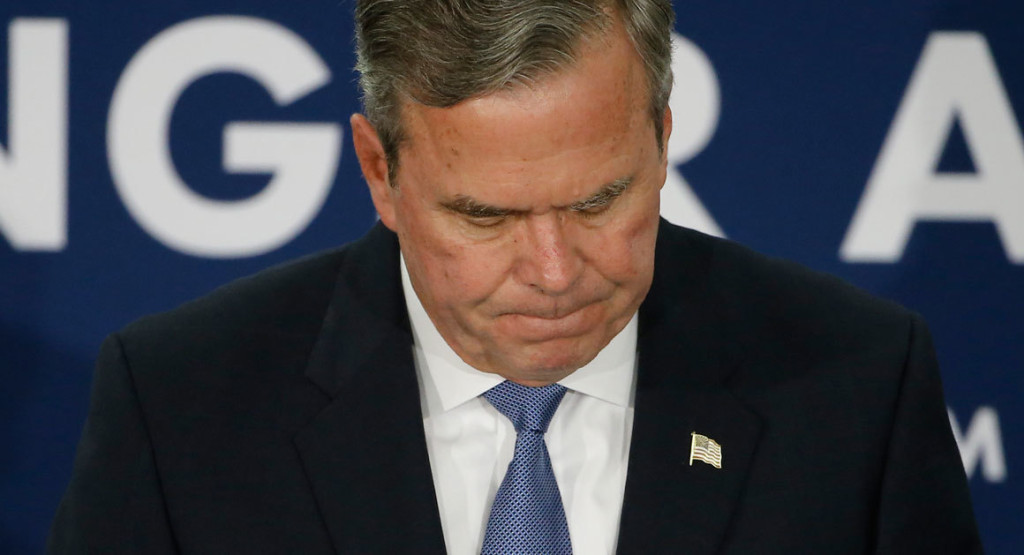FEBRUARY 23, 2016
It wasn’t supposed to end this way.
The plan seemed foolproof. After all, it worked for George W. Bush in 1999 — woo your family’s favorite fat-cat donors to back a Presidential run, amass a huge war chest coupled with endorsements from party leaders and scare off any would-be rivals. It was the “shock-and-awe” version of running a successful campaign.
Throughout 2014 and 2015 John Ellis (“Jeb”) Bush did just that, as he raised millions and millions of dollars for his campaign super-PAC, Right to Rise, that dwarfed the available cash for every other contender. With positive feedback from party leaders, it appeared to be “Jeb’s Time,” and by 2015, he was anointed as the party’s front-runner.
“Shock-and-awe” was working just as it had for his brother, except for one thing — with all the all the money he raised and all of his rising poll numbers, Jeb forgot to clear his field of rivals. In fact, by the time the filing deadline closed with the Federal Election Commission, there were seventeen major candidates for the Republican presidential nomination. The prospect of running against Jeb Bush didn’t scare rivals away — it seemed to attract them.
From all reports, Bush Land didn’t appeared too worried. These other people couldn’t match Jeb’s experience (or bankroll). Who were they, anyway? — a failed Silicon Valley CEO, a retired neurosurgeon and, most laughable of all, a reality-show TV star. Sure, there might be some brief flirtation with a few of these characters, but Republican voters would soon come back to their senses, so they thought, and come home to them. Because, after all, he was Jeb.
That turned out to be the problem. He was Jeb.
The first inklings of trouble arose in May 2015, one month before Jeb announced his candidacy, when, during an interview with Megyn Kelly on Fox News, Bush was asked, “Knowing what we know now, would have authorized the [Iraq] invasion?” An easy softball question right over the plate that Jeb could knock out of the park — simply say no and move on. “I would have,” bragged Jeb. Huh? The next day, Sean Hannity gave him a way to wiggle out of his previous answer, and Bush refused to take the hint, insisting that he doesn’t answer hypotheticals. This went on for 5 days until Bush finally stumbled into a politically palatable answer, raising some questions as to whether Bush was rusty.
After all, Bush had not run a campaign for 13 years, so maybe our front runner might need a little time to get up to speed and to get used to the demands of social media, party insiders thought. It took him a lot longer than anyone could have imagined.
When Bush declared his candidacy on June 15, he led all the polls with nearly 18% of the Republican electorate, with no other candidate in double digits. The next day, Donald Trump announced his candidacy, and it was all downhill from there. A month later, Trump passed Bush in the polls, and by Labor Day, Bush had fallen to single digits from which he would never recover.
What happened? Yes, there is the academic argument that voters are in an anti-establishment mood, and no one so personifies the establishment than someone with the last name of Bush. And certainly branding himself as only “Jeb!” [no last name] made him the butt of comedians’ jokes everywhere. Here’s a tip: unless you’re a musical comedy, never use an exclamation point in your name.
But, let’s face it, Jeb Bush was a lousy campaigner. He seemed stiff and awkward right from the start, and when Trump, who has the talent to zero in on an opponent’s precise weakness, termed him “low-energy,” the effect of Trump’s dismissive insult was devastating. And the fact that Bush never really fought back only proved that the charge was true.
And then there were the gaffes. Oh, the gaffes! Using the offensive term “anchor babies” and then saying it only applied to Asians. Observing that he doesn’t think we need half a billion dollars for women’s health issues. Responding to a mass school shooting with “Stuff happens.” Answering a question about his favorite superhero by noting how “hot” TV’s “Supergirl” looks. Ah, the memories.
But there came a moment earlier this month when, for the first time, I really felt sad for Jeb Bush. It happened on Feb. 2, the day after he got shellacked in the Iowa caucuses. He was appearing before a small crowd, yet Bush was fired up, exhorting the crowd to step up and finally elect for this country a strong Commander in Chief! Silence. Crickets. Nothing. “Please clap,” asked Bush plaintively. That moment to me was the Bush campaign in a nutshell.
If we consider the Bushes and Clintons to be our current political dynasties, there’s almost something Shakespearean about this family and this primary. Father triumphs in this primary and goes on to be leader of the kingdom. Dissolute son also triumphs in this primary (twice!) and goes on to an even longer reign. When the noble favored son follows his family’s path, he is soundly routed by the House of Trump. South Carolina was where George H.W. and George W. Bush raised their hands in victory, and where Jeb Bush took his final bow.
Please clap.












